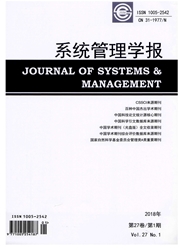

 中文摘要:
中文摘要:
中国粗放型的经济发展模式导致能源消耗严重,能源强度和经济增长的关系日趋成为研究热点。基于1985~2011年的能源强度及其影响因素的数据建立VAR模型,运用格兰杰检验探索了能源强度及其影响因素间的因果关系,并运用脉冲响应函数分析法研究变量间的长期动态关系。研究结果表明,能源强度及其影响因素存在协整关系。另外,格兰杰检验结果表明,经济增长是能源强度和能源结构的格兰杰原因,能源结构和政府干预均是经济增长的格兰杰原因。脉冲响应函数分析的结果揭示了它们之间的动态变化关系。并且,研究结果揭示,我国现阶段经济发展对能源的依赖性较强,难以在不影响经济发展的同时实施能源保护政策,实施新能源的技术攻关亟待推进。面临我国的能源消耗现状,虽然经济发展最终带来能源强度的减小及能源结构的优化,但是还必须在追求经济发展的同时兼顾能源消耗的效率。新能源行业的技术突破以及政府的政策性补贴成为新能源得以被广泛使用的关键。同时,政府则需要加大财政支持,并保证适度的宏观调控,找到对经济发展干预与调控的平衡点。
 英文摘要:
英文摘要:
Rapid economic development has led to severe energy consumption in China,and the relationship between energy consumption and economic growth increasingly becomes a research hotspot.In this paper,a VAR model is established to examine the relationship between energy intensity and its influential factors.The Granger test is used to explore their possible causal relationship and the impulse response function analysis is used to establish the long-term dynamic relationship among these variables with possible Granger causality.The model is then tested using data from 1985-2011 in China.The results show that there is a co-integration relationship between energy intensity and its influential factors.In addition,as the results of Granger test show,there appears a causal relationship between economic growth and energy intensity,economic growth and energy intensity structure,and energy structure andgovernment intervention.The result of the impulse response function reveals these dynamic relationships.Moreover,the results reveal that energy conservation policies would not be implemented without affecting the current economic development.That is,the current economic development has a strong dependence on energy consumption,and it is urgently needed to advance the implementation of new energy.Faced with the current situation of energy consumption,it is wise to pursue economic development while taking into account the efficiency of energy consumption,though economic development may bring down energy intensity and re-optimize the energy structure.Along this line,technological breakthroughs in new energy industry and government policy-related subsidies are the key to the adoption of new energy.Meanwhile,the government needs to increase the financial support while ensures an appropriate macro-control,and balances between intervention and regulation to economic development.
 同期刊论文项目
同期刊论文项目
 同项目期刊论文
同项目期刊论文
 期刊信息
期刊信息
